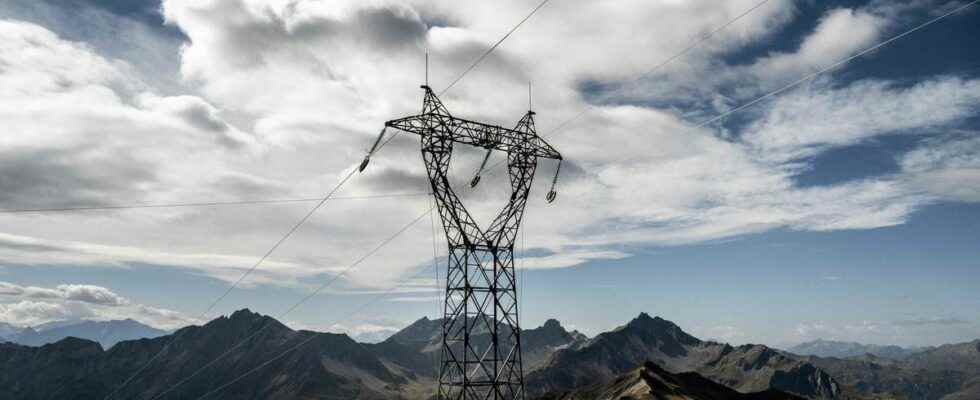If he rules out the risk of a blackout, the network manager has underlined the central role of energy sobriety this winter.
The winter promises to be harsh, and France, like its neighbours, will have to make efforts not to run out of energy. This Wednesday, the tricolor electricity network manager, RTE, presented at a press conference “its forecast studies for next winter“. A way to support the various players in preparing for the coming months, the conference having taken place just a few hours before the speech of Elisabeth Borne, who will present in the afternoon “the state of the country’s energy situation and the measures to protect the French“.
Expected, RTE’s forecasts provide a better understanding of the challenges awaiting France, and the means to deal with them. Because the country must face an exceptional situation: of course, France is less dependent on Russia for its supply than its neighbors, but the network is deprived of part of its nuclear fleet, and the summer drought has “greatly reduced hydraulic production“, worsening this balance sheet.
The situation of the network remains less complex than that of gas, which concentratesmain uncertainties», nuance RTE. Still, the weakening of nuclear power plants implies that the “vigilance period“, in terms of electricity supply, starts this fall and will last “several months», contrary to previous years, where this one focused «around January“. At a press conference, Xavier Piechaczyk, chairman of the RTE management board, thus warned that the months of November and December were going “be as complicated as the month of January, and that’s unprecedented“.
No risk of blackout
Good news, however: despite the difficulties encountered by the tricolor network, in theory, unless there is a particularly harsh winter, “the risk of imbalance [entre l’offre et la demande] remains weak“, notes RTE, which adds that”the electrical system will operate normallyover the entire period.
RTE modeled several scenarios, crossing three electricity production scenarios with four types of winter. “If the winter is mild, you probably won’t hear from us“said Xavier Piechaczyk. Likewise, “if winter weather conditions do not deviate too much from normal seasonal conditions, the risk of imbalance (on the electricity network) is low“. In contrast, “if the winter is very cold, the risk of imbalance becomes greater“, he warned. But these extreme situations, with a lot of Ecowatt red signals, meaning that the electricity network is very strained, “are not the most probable, they are even the most improbable“, underlined Xavier Piechaczyk, who estimates this risk at”less than a one in ten chance from a weather point of view, combined with the risk of a severe gas shortage“.
Because the company has backup means to be activated before a disaster to guarantee the balance of the French electricity network, which can be activated one after the other. First we find the red signal of the Ecowatt alert, which “must initiate voluntary and massive reductions in consumption“Said Xavier Piechaczyk. Then there is the interruptibility of the French electro-intensive sites, then the voltage drop of 5% on the distribution network. The last resort being the consumer load shedding procedure. “The goal is not to use it this winter», reminded the Chairman of the RTE Executive Board.
In the worst scenario, in which the difficulties – severe winter, lack of sobriety, European gas shortage… – would accumulate, “the energy deficit would be a maximum of 1% on a winter scale“. Enough to require additional means, during the most affected days, including “business mobilizationor, in the worst case, “organized cuts– load shedding – but not enough to achieve the blackout. “Never“, France should not arrive at this extreme situation, reassures RTE.
The importance of “sobriety»
In his report, the network manager also notes the importance of demand in the equation: “If this decreases, in a manner chosen by sobriety measures and/or in a constrained manner […]the risk to security of supply this fall and winter is much lower», Underlines the document. And this, even in the event of particularly degraded weather conditions.
In other words, every gesture counts, and the sobriety plans of the various public and private actors are essential: the sobriety variant would thus make it possible to reduce “by a factor of two of the probability of using backup means and resorting to load shedding“. The drop in demand necessary to get through the most difficult periods remains limited: in the event of difficulties encountered on certain days, “the collective effort necessary to avoid recourse to load shedding would relate to 1 to 5% of consumption in the majority of cases. “, describes the report. A figure that could go up to “15%”, “in the event of extreme weather conditions”.
The manager also points out that the consumption peaks concern in particular the morning, from 8 a.m. to 1 p.m., and the evening, from 6 p.m. to 8 p.m.: he therefore suggests “move» consumption, beyond these times, to reduce tension on the network. Launching a call for general mobilization to preserve the electricity network, RTE also provides some advice for reducing its consumption, such as lowering the heating at home and at work, limiting lighting at home and at work (generalizing the use of low-energy light bulbs, switching off unused lights at home, etc.), or even moderating the use of cooking appliances at home and at work, in the event of a red Ecowatt signal.
SEE ALSO – “End of the illumination of the Eiffel Tower”, “extinction of public monuments”, Anne Hidalgo details her energy sobriety plan
